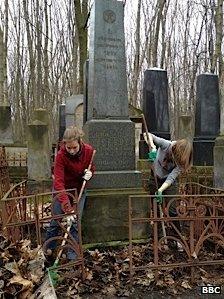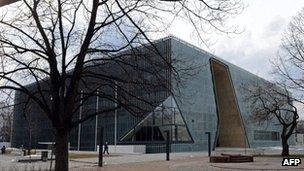Poland's Jews: A tragic history
- Published
Poland is still coming to terms with what happened to its Jewish community during World War II
Poland is marking the 70th anniversary of the Warsaw Ghetto Uprising on Friday, one of the most remarkable acts of resistance in World War II, a period when the almost 1,000-year-old history of Polish-Jewish relations underwent its most severe test.
How Poles and Jews behaved toward each other during 1939-1945 is still being evaluated and remains highly provocative here.
This was clearly seen last November with the premiere of the movie Poklosie ("Aftermath"), a fictional thriller that told the story of a Polish man who returns to his hometown and discovers a dark secret about its past.
During the war, at the instigation of the Nazis, local people, including his own father, rounded up the town's Jews, locked them in a building and set it on fire.
In the last 10 years or so it has become widely known that massacres like this actually happened in several Polish towns, most notably in Jedwabne, north-eastern Poland, where Poles at the instigation of the Nazis murdered more than 300 Jews.
Some right-wing critics and politicians branded the movie "anti-Polish", arguing that it paints a false picture of Poles as collaborators with Nazi Germany.
The history of Polish-Jewish relations is also controversial because there is a perception among some Poles that Jews in the eastern part of the country welcomed the Red Army and collaborated with the Soviet occupation forces.
'Incredible discussion'
The film's lead actor, Maciej Stuhr, was called a "Polish traitor", a "Jew" and "Adolf Hitler" on Internet forums. Its producer, Dariusz Jablonski, said he made the movie because he believes film is a good platform to raise this issue, especially with younger people.
"During communist times we were told that Poles were always the noble knights of the Second World War. We were either victims or we fought against the Nazi occupation and were saving Jews.
"As in the life of any family, society or nation there are black holes along with the positive stories. This was our black hole. The discussion the film caused revealed how much still needs to be done," Mr Jablonski told me.
Poland did indeed suffer horribly from not one but two brutal occupations, Nazi and Soviet, during the war. More than five million of its citizens, three million of them Jews, were killed.
About as many Poles were killed in the bombing of Warsaw in 1939 as Germans killed in the bombing of Dresden in 1945.
Added to this is the fact that many more Poles are honoured by Israel for saving the lives of Jews during the war than any other nation.

Volunteers have been working to help clear up Poland's Jewish cemeteries
After communism collapsed in 1989, academics were free to research the brutal reality of this war-time period, when the occupying Nazis induced Poles to give up Jews and forbade them to help their Jewish neighbours on pain of death.
The debate was blown open in 2001 with the publication of the book Neighbours by Polish emigre professor Jan Gross, which discussed Jedwabne.
"It unleashed an incredible national discussion. It went on for about a year. Almost every day there was something in the newspapers, journals, magazines, radio and TV.
"Ten years earlier Poles discovered that something horrible happened to Jews and 10 years later they said, 'Wait a second, you know, some of our own people helped'," Poland's chief rabbi, Michael Schudrich, remembers.
"Under the communists one of the mantras was 'We Poles suffered under the Nazis', and now all of a sudden they're being told, yes you were persecuted but some of you were not only victims, some of you were even collaborators.
"That entails a change of a national image, which is very hard, and I have tremendous respect for Poles who were able to say we are not as perfect as we thought. For a country to do that is simply inspiring. There are still Poles today that don't want to admit it and that's a black stain on the soul of Poland," he added.
Jewish history
Staff at the new Museum of the History of Polish Jews, external, built on the site of the former Warsaw Ghetto, expect its portrayal of this period to be the most controversial.
The museum, which took almost 20 years to get off the ground and will cost around $100m (£65m) once complete, will open its doors on the anniversary of the uprising for educational and cultural workshops. The core exhibition is expected to open early next year.
The museum will seek to educate and inform people about the long and rich history of Jewish life in Poland.
Jews first came to the country in the Middle Ages and settled in large numbers because of the relatively tolerant attitude towards them. It became the largest Jewish community in the world.
Ninety per cent of that community was wiped out in the Holocaust and today, there are only about 40-50,000 people with Jewish roots living in Poland.

The new Museum of History of Polish Jews is now partially open
"In Poland now the real issue is the lack of knowledge about Jewish life and what its importance is for Poles. Jews were living here for 1,000 years and as a result we have Hebrew and Yiddish words in the Polish language, Polish cuisine is filled with Jewish dishes.
"Children in every kindergarten learn poems written by Jewish poets. People drive Citroen cars without knowing it was a company established by Polish Jews. We are grateful to Polish Jews who emigrated to the US and created Hollywood. When we tell people this they open their eyes wide," museum spokesman Piotr Kossobudzki said.
Of course, anti-Semitic attitudes persist in Poland as they do in most European countries. But in the last 20 years, thanks to the late Polish pope, John Paul II, calling anti-Semitism a sin, progress has been made.
Jewish history and culture have also become increasingly popular among Poles. The country now has major Jewish cultural festivals and demand for Yiddish and Hebrew language classes has risen.
Poles are also helping the existing Jewish community to preserve its cemeteries. Earlier this week, around 100 volunteers took part in cleaning up Warsaw's Jewish cemetery.
"It's a shame. We used to have such a huge community of Jewish people here in Poland. There are lots of monuments, cemeteries and places connected to them, so it would be good if Polish people could do something to look after them," 28-year-old volunteer Katarzyna Regulska said.
- Published20 April 2012
- Published16 June 2012
- Published27 January 2013
- Published22 July 2012